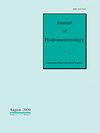青藏高原日降水与地表气温的百分位数关系
IF 2.9
3区 地球科学
Q2 METEOROLOGY & ATMOSPHERIC SCIENCES
引用次数: 0
摘要
气候变化显著影响水文循环。降水是陆地水文系统最重要的大气输入之一,其变率对环境和社会经济发展具有重要影响。大气变暖加剧了水文循环,增加了大气水汽浓度和全球降水。强降水与温度的关系已被广泛研究。然而,在不同的百分位数范围内的关系还没有得到充分的分析。此外,基于百分位的回归为研究影响这种关系的其他因素(降水类型)提供了一个简单而有效的框架。本文对青藏高原日降水量在不同百分位数范围内的温度依赖性进行了综合研究。结果表明:①大部分台站呈峰状尺度结构,高原东北部和南缘分别呈单调的正、负尺度结构;2)正、负尺度率在高原南(北)区表现出较强(较弱)的敏感性。日降水量随温度的总体增增率用Clausius-Clapeyron关系进行了标度。(3)日降水高百分位数比低百分位数表现出更大的正标度率。4)峰点温度与局部温度密切相关,区域峰点温度大致在10℃左右。本研究旨在更好地了解青藏高原不同百分位数范围降水与地表气温的关系。这一点很重要,因为基于百分位的回归不仅准确地描述了降水对变暖温度的响应,而且还为研究可能影响这种关系的其他因素(降水类型)提供了一个简单而有效的框架。对不同区域和不同百分位范围的灵敏度和峰点温度进行了评价和比较;本研究还试图概述其影响因素。据我们所知,这项研究是第一次对日降水对地表气温的依赖进行基于百分位数的分析。本文章由计算机程序翻译,如有差异,请以英文原文为准。
Percentile-Based Relationship between Daily Precipitation and Surface Air Temperature over the Qinghai–Tibet Plateau
Climate changes significantly impact the hydrological cycle. Precipitation is one of the most important atmospheric inputs to the terrestrial hydrologic system, and its variability considerably influences environmental and socioeconomic development. Atmospheric warming intensifies the hydrological cycle, increasing both atmospheric water vapor concentration and global precipitation. The relationship between heavy precipitation and temperature has been extensively investigated in literature. However, the relationship in different percentile ranges has not been thoroughly analyzed. Moreover, a percentile-based regression provides a simple but effective framework for investigation into other factors (precipitation type) affecting this relationship. Herein, a comprehensive investigation is presented on the temperature dependence of daily precipitation in various percentile ranges over the Qinghai–Tibet Plateau. The results show that 1) most stations exhibit a peaklike scaling structure, while the northeast part and south margin of the plateau exhibit monotonic positive and negative scaling structures, respectively. The scaling structure is associated with the precipitation type, and 2) the positive and negative scaling rates exhibit similar spatial patterns, with stronger (weaker) sensitivity in the south (north) part of the plateau. The overall increase rate of daily precipitation with temperature is scaled by Clausius–Clapeyron relationship. 3) The higher percentile of daily precipitation shows a larger positive scaling rate than the lower percentile. 4) The peak-point temperature is closely related to the local temperature, and the regional peak-point temperature is roughly around 10°C.
This study aims to better understand the relationship between precipitation and surface air temperature in various percentile ranges over the Qinghai–Tibet Plateau. This is important because percentile-based regression not only accurately describes the response of precipitation to warming temperature but also provides a simple but effective framework for investigating other factors (precipitation type) that may be affecting this relationship. Furthermore, the sensitivity and peak-point temperature are evaluated and compared among different regions and percentile ranges; this study also attempts to outline their influencing factors. To our knowledge, this study is the first integration of percentile-based analysis of the dependence of daily precipitation on surface air temperature.
求助全文
通过发布文献求助,成功后即可免费获取论文全文。
去求助
来源期刊

Journal of Hydrometeorology
地学-气象与大气科学
CiteScore
7.40
自引率
5.30%
发文量
116
审稿时长
4-8 weeks
期刊介绍:
The Journal of Hydrometeorology (JHM) (ISSN: 1525-755X; eISSN: 1525-7541) publishes research on modeling, observing, and forecasting processes related to fluxes and storage of water and energy, including interactions with the boundary layer and lower atmosphere, and processes related to precipitation, radiation, and other meteorological inputs.
 求助内容:
求助内容: 应助结果提醒方式:
应助结果提醒方式:


